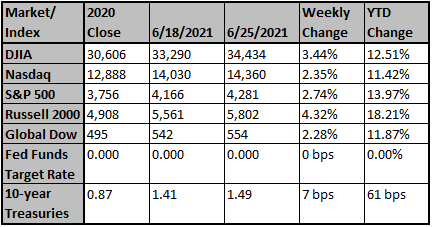The last time the Federal Reserve announced its reduction in its bond buying policy to return interest rate policy to the free markets, was a bit messy. We thought it would be interesting to take a look back to the last time this Fed enacted this policy, to see if it will give us clues as to what we can expect when the Fed announces its tapering policy again in the upcoming months.
Remembering the 2013 Taper Tantrum
Back in 2013, when the market experienced the so-called “Taper Tantrum,” the 10-Year treasury rate rose about 130 basis points over the course of four months.
10-Year Real Yields Ultimately Turned Positive
Looking back at real yields from during the Taper Tantrum shows that they went from being consistently negative, similar to where they stand today, to positive, and it proved to be an overall change in the landscape. Perhaps a reduction in asset purchases later in the year is the catalyst for nominal yields to move higher and real yields to begin to approach positive territory again.
Sector Performance During 2013 Taper Tantrum
From a sector standpoint, the Industrial sector, followed by Consumer Discretionary, were the best performing sectors during the 2013 Taper Tantrum. On the opposite side of the spectrum were your yield-oriented sectors of Real Estate, Communications, Utilities, & Consumer Staples. It is worth noting the Communication sector composition in 2013 was more yield-oriented than it is today.
Volatility Spiked During The 2013 Taper Tantrum
A closer look at asset class performance during the 2013 taper tantrum shows that the VIX was the best performing asset class, followed a close second by WTI oil. REITs, Emerging Markets, & Bonds were the biggest losers.
Today, the economic recovery is not complete (eg, U.S. initial jobless claims at 411,000 last week), so there’s not a rush to tighten policy. But discussing an end to emergency easing is now necessary. Trend improvements in the timely data give us confidence, even if there are obstructed pathways & remaining global virus variant concerns (eg, Sydney lockdown, S. Africa alert).
10-year Treasury yields ended last week at 1.53%. WTI oil prices were up to $74. Stimulus-boosted demand is still outpacing supply.
Typical business cycles are driven by volatility in goods, and in particular durable goods, which create financial crises. There’s a shock, and inventories rise. Undesired inventories lead to production cuts. Production cuts lead to firings. Job loss can mean defaults for leveraged individuals. Stress in the financial sector spreads the recessionary impulse, sometimes catastrophically (eg, 2008).
But 2020 was not a financial cascade, it was a global health crisis. Instead of goods, the recent cycle was heavily impacted by services (especially in-person activities). Usually, services are more stable, helping to cushion the economy, ie, individuals continue to consume things like haircuts, educational services & medical services even in downturns. Not so in the past 15 months.
While it’s always dangerous to say “it’s different this time,” the uniqueness of the entry into the 2020 recession is yielding differences on the way out. Policy responded aggressively, and the importance of a relatively quick discovery of a medical solution (vaccine) through President Trumps Project Warp Speed, to the medical problem (virus) should not be underestimated. Bottlenecks that have accompanied economic re-openings post-vaccination(s) have created a spike in price metrics, and some sectors have had to raise pay to attract workers.
In the meantime, part of the solution has been for workers to increase their hours. It is also typical to see productivity (output-per-hour) accelerate early in a business cycle. Recessions focus one’s attention on the cost of doing business, workers who are called back early are often the best matches for the job, and downturns generally force change.
This part of the historical pattern has played out again. We are approaching new highs on GDP, with many fewer workers. Productivity has surged.
Whether productivity gains last, after such an initial boost, is a more important question for the durability of any expansion. Output-per-hour gains allow economic growth without too much worry about inflation. Wages can rise, but productivity-adjusted wages (unit labor costs) are more stable. Instead of wages or profits, it can be wages and profits expanding.
Bottom line: this cycle has been atypical, as it has been driven by services & a health crisis rather than goods & a financial crisis. Inflation metrics have surged, but this looks excusable in the near-term due to a large fiscal push hitting bottlenecks. Productivity has improved as firms seek to regain levels of production with fewer workers. The future path of the economy looks to be dependent on the ability to continue output-per-hour gains, allowing profits & wages to rise together.
Some quantitative models such as the Kahn-Rich model (updated at the NY Fed site) have currently opened the door to the U.S. switching to a higher productivity regime. The next several quarters should provide a good experiment, with global consequences. We expect a robust recovery, especially in service jobs. If productivity can stay above trend as these jobs are added back to the economy, the case for a durable productivity improvement should improve. That’s one of the most important cyclical questions at the moment.
Source: Strategas

Chart reflects price changes, not total return. Because it does not include dividends or splits, it should not be used to benchmark performance of specific investments. Data provided by FactSet.
Sincerely,
Fortem Financial
(760) 206-8500
team@fortemfin.com
Latest News
Fed Officials Debate Scaling Back Mortgage-Bond Purchases...
Soaring home prices lead some officials to call for the central bank to stop buying mortgage bonds sooner than Treasury bonds.
Wall Street Journal
Jun 28, 2021
US stock ownership nears record, will keep climbing
U.S. stocks look to be the hottest investment in town, and that popularity shows no signs of slowing down this year.
Fox Business
Jun 28, 2021
Americans Leave Unemployment Rolls Faster in States Cutti...
Some Missouri businesses see an uptick in applications after the state set a June end to pandemic jobless aid.
Wall Street Journal
Jun 27, 2021
New York and Other Northeast States See Large Drop in Une...
Covid-19 stunned the area's economy, but the region's labor market is improving faster than the rest of the country.
Wall Street Journal
Jun 26, 2021
